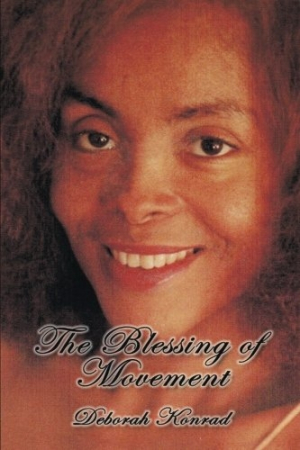The Blessing of Movement
Konrad’s story is an inspirational memoir about life with disability and caring for dying relatives.
Deborah Konrad’s The Blessing of Movement tells the story of her family, in particular her sister Sandra, who became a quadriplegic in her twenties. In documenting how love kept Sandra and the rest of the family going through years of illness, Konrad shows the strength of the human will.
Konrad, the youngest of three daughters, was born into an African American family in Houston’s Jim Crow days. Her sister Sandra, nine years her senior, engaged in self-destructive behavior during college and was arrested twice for fraud and burglary. A fight with a boyfriend ended disastrously: a bullet hit Sandra’s spinal cord and paralyzed her. Determined to live wholeheartedly, Sandra finished her chemistry degree and eloped with Charles. Although she had ongoing health challenges, she maintained a cheerful perspective. Konrad was a caregiver for her parents and Sandra in the months leading to their deaths.
Rather than beginning with her own birth or the start of Sandra’s troubles, Konrad wisely chooses to open with a different memorable time: Sandra’s optimism when facing breast cancer in 2011. The first line—“She rolled into the facility like a rock star with a very small but very attentive entourage”—establishes Sandra as an admirable, larger-than-life figure readers will want to learn more about. Throughout the book, Konrad investigates the secret strength that underlay “the sunny disposition of the pretty paralyzed woman.” She concludes that it was all about thankfulness, as proven by Sandra’s gratitude journal.
Konrad does a solid job of building suspense, with phrases like “How could things get worse? Never challenge worse,” and “The first domino had fallen,” introducing a touch of foreboding in part 1. Part 2 picks up with the aftermath of Sandra’s shooting, but leaves a juicy surprise for the ending. Numerous black-and-white family photos show that Sandra’s smile was dazzling both before and after her injury.
With the focus so clearly on Sandra, and despite occasional sidetracks to chronicle her care for her dying parents and Charles’s decline from prostate cancer, Konrad’s own life undeniably gets sidelined. For instance, a failed marriage is reduced to one sentence, and she only mentions her professional struggles in passing. More self-reflection would provide a good match for her insights into her sister’s character, while a careful edit to clear up typos and grammatical errors would help the book fully live up to the power of its themes.
The lessons Konrad learned from Sandra endure: we don’t choose what happens to us, but we can choose to be unafraid and love unconditionally.
Reviewed by
Rebecca Foster
Disclosure: This article is not an endorsement, but a review. The publisher of this book provided free copies of the book and paid a small fee to have their book reviewed by a professional reviewer. Foreword Reviews and Clarion Reviews make no guarantee that the publisher will receive a positive review. Foreword Magazine, Inc. is disclosing this in accordance with the Federal Trade Commission’s 16 CFR, Part 255.

